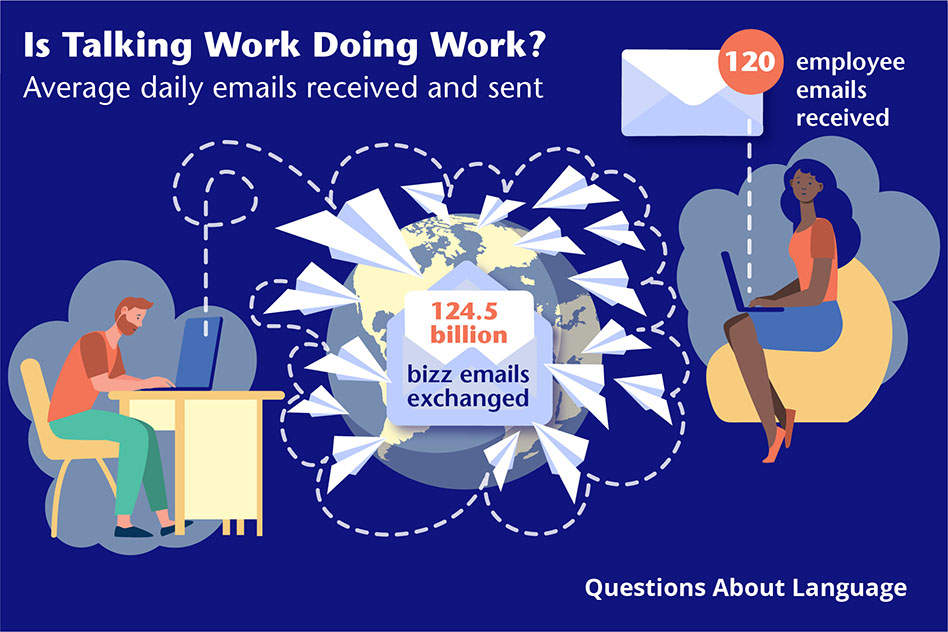Questions About Language: Is Talking Work Doing Work?
Posted on: August 11, 2020
When we communicate at work, do we consider talking to our colleagues doing work? ‘Talking work’ could mean discussing a project whilst making a cup of coffee in the office kitchen, just as the use of language in our online video calls and emails might influence our success in communicating an idea – both resulting in ‘doing work.’ But there’s a lot of unpacking needed to understand how this is done in a way that makes talking work doing work, with more than one factor impacting its success:
In the fluid business world, organizations compete for global talent, employees operate in a multilingual, diverse and highly competitive environment and are called to work in and across linguistic, national, professional and geographical boundaries. People in different positions, with varying backgrounds, expertise and years of experience carry out their professional roles by negotiating “norms” which are different to their own and their own ways of doing things. And let’s not forget, any workspace is a political setting where power relationships are at play. In this context the management of mundane daily events require a handling of complex communications, which is often unacknowledged.
It is for this reason, the importance of communication in the workplace is now considered a truism. In scholarly and lay business literature we associate good communication with profitability, productivity, team building and client relationships (McQuerrey, 2017: Why Is Effective Communication Important in Management? ).

The second article in our Questions About Language series draws on workplace sociolinguists to argue that talking work is doing work and interpersonal or relational interaction is not only prevalent but inseparable from transactional or task-based talk.
Language negotiation between employees
When exploring is talking work doing work? authors Jo Angouri and Ifigeneia Machili discuss one of the most common tasks in the workplace, the reaching of decisions. They show how it is done in the context of the iconic business email, paying special attention to the way interactants negotiate formality and the use of global and local languages as they project, claim and resist group membership.
Since their uniform adoption in the world of business around the 1990s, emails have become the dominant means of communication. Popular literature suggests that on average employees receive 120 emails every day and the daily number of business emails received and sent is 124.5 billion:

(Lyncova, 2019: The Surprising Reality of How Many Emails Are Sent Per Day ).
Unpacking the language used in business emails
Angouri and Machili discuss how language is used strategically in decision making:
“We posit that an examination of formal and informal linguistic features, and global and local languages, can shed light on the way employees negotiate their professional roles and relations. In practice, this results in ways to do power, to include and/or exclude access to decision making as employees participate in collective problem solving. We base the discussion on our analysis of the data supplemented with the participants’ views as these were expressed in discourse-based interviews (for a discussion of the methodology see Machili 2014, Writing in the Work Place ).”
They look at greetings, reference (use of I and we) and degree of explicitness in relation to formality, as well as use of local languages and English as the global Lingua Franca (the language understood by all members of the organization).
Reference
– specifically, the use of we is associated with formality as it is employed to represent an organization when I indexes more personalized style in business emails (see Machili 2014,
Writing in the Work Place
).
Greetings
– the use of last names and signatures index formal style, while a lack of greetings and more personalized salutations like hi, bye, take care index informality (Rice, 1997:
An analysis of stylistic variables in electronic mail
; Gains, 1999:
An investigation into the text features of E-mail
; Crystal 2006:
Language and the internet
).
The power shift in email chains – Scholars have often associated email chains involving multiple participants with record keeping, accountability to superiors and company representativeness, and accord the chain official formal status (Stanton 2004: Mastering communication ). Yet through the CCing facility, participants’ status may change from “active decision makers” to mere “observers” and others may be added or excluded from particular emails of the chain, with the status of emails alternating from formal to informal and public to private accordingly, as the chain evolves.
The Results
The authors’ data shows that language is strategically used to include or exclude access to decision making processes. Decision making is a process and although agreement at certain points constitutes anchors for future actions, decisions feed into larger and more complex constellations of actions; the email chain examined also illustrates the use of multiple languages to in/exclude and manage social relationships.
Professionals need to manage a sensitive equilibrium between their task-oriented activities and social relationships for which they deploy all the resources of meaning in their inventory. We should also remember that what counts as a decision in one organization may not count as one in another.
HOW we talk work establishes our professional roles and relations
As emails have been found to be more efficient than other means in reaching people from different organizations, departments and hierarchical levels, and in different geographical and time zones and areas of expertise quickly and at no cost, they provide an ideal space for solving problems and making and negotiating “decisions” rapidly. And although as one employee from the company participating in their research noted, “Whenever you have a problem, you can immediately reach a group of people who can help you”, emails also provide the space for the participants to forward their own agendas by negotiating their professional roles and relations. Talking or rather emailing work in this context is doing work.
Workplace Socio/linguistics grew exponentially in the ‘80s and the ‘90s, evolving to a research field addressing how individuals operate in different local linguistic, national, organizational, occupational and team contexts and turned a critical gaze to the workplace as a site of struggle where power hierarchies are negotiated, perpetuated, and (sometimes successfully) challenged. Workplace sociolinguists have shown that talking work is a critical part of enacting professional roles and responsibilities.
Find out more or purchase the title here .
Other articles from the Questions About Language blog series based on the book by Laurie Bauer and Andreea Calude, include Why Do People Swear? and What makes a Language a Language?. Discover more titles from our Linguistics range here .

